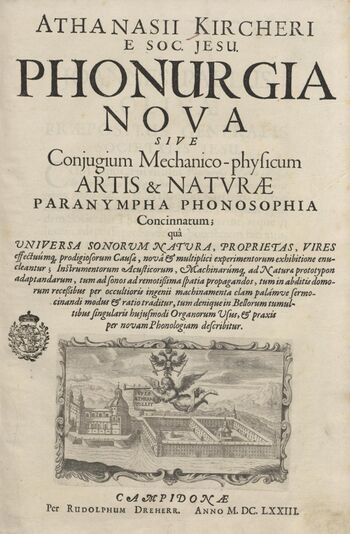Athanasius Kircher
 Athanasius Kircher. Frontispiece, Mundus Subterraneus, 1664. | |
| Born |
May 2, 1602 Geisa, Imperial Abbey of Fulda, Holy Roman Empire (today Germany) |
|---|---|
| Died |
November 27, 1680 (aged 78) Rome, Papal States |
| Web | Wikipedia, MDZ, MPIWG, LHL, Academia.edu, Open Library |
Athanasius Kircher (1602–1680) was a German Jesuit scholar.
A refugee from war-torn Germany, Kircher arrived in Rome just after Galileo's condemnation, where he was heralded as possessing the secret of deciphering hieroglyphics. He wrote over thirty separate works dealing with subjects ranging from optics to music, from Egyptology to magnetism. He invented a universal language scheme, attacked the possibility of alchemical transmutation and devised a host of remarkable pneumatic, hydraulic, catoptric and magnetic machines, which he displayed to visitors to his famous museum, housed in the Jesuit Collegio Romano. His books, lavishly illustrated volumes destined for Baroque princes with a love of the curious and exotic, are permeated with a strong element of the Hermetic philosophy of the Renaissance, synthesized with the Christianized Aristotelianism of the Jesuit order to which Kircher belonged. (Source)
Contents
Works
(in Latin unless noted otherwise)
- Ars Magnesia, Herbipoli: Zinck, 1631, 63 pp, WDB, Gallica.
- Primitiae gnomoniciae catroptricae, Avenione: Pivot, 1635, 228 pp, MDZ.
- Prodromus coptus sive aegyptiacus, Romae: Fide, 1636, 338 pp, MPIWG.
- Specula Melitensis encyclica, hoc est syntagma novum instrumentorum physico-mathematicorum, 1637.
- Magnes sive de arte magnetica, Romae: Grignani, 1641, 916 pp, MPIWG.
- Lingua aegyptiaca restituta, Romae: Scheus, 1644, 622 pp, Gallica, RBR.
- Ars magna lucis et umbrae in decem libros digesta, Romae: Scheus, 1646, 935 pp, MPIWG, LHL, RBR.
- Obeliscus pamphilius, Romae: Grignani, 1650, 560 pp, MPIWG, IA, RBR.
- Musurgia universalis, sive ars magna consoni et dissoni, Romae: Corbelletti, and Grignani, 1650, 690 pp, MPIWG, RBR.
- Oedipus aegyptiacus, 3 vols., Romae, 1652-54, 424+440+546+592 pp, MPIWG v1, UH v1, MPIWG v2/1, Google v2/1, MPIWG v2/2, Google v2/2, Google v3.
- Itinerarium extaticum s. opificium coeleste, Romae: Mascardi, 1656, WDB.
- Iter extaticum secundum, mundi subterranei prodromus, Romae, 1657, MDZ.
- Scrutinium physico-medicum contagiosae luis, Romae: Mascardi, 1658, 252 pp, MPIWG, HUL.
- Pantometrum Kircherianum ... explicatum a G. Schotto, 1660, 408 pp, MPIWG.
- Iter extaticum coeleste, quo mundi opificium, Herbipoli: Endter, 1660, MPIWG, RBR.
- Diatribe de prodigiosis crucibus, Romae: Deuerlin, 1661, MDZ, RBR.
- Polygraphia, 1663, RBR.
- Mundus subterraneus, 2 vols., Amsterdam: Jansson-Waesberg, 1665; 1678, 366+507 pp, MPIWG v1, MPIWG v2, UOL.
- Historia Eustachio-Mariana, Romae: Varesius, 1665, WDB.
- Arithmologia sive de abditis Numerorum mysteriis, Romae: Varesi, 1665, 301 pp, MPIWG.
- Obelisci Aegyptiaci, Romae: Varesi, 1666, 146 pp, MPIWG, RBR.
- China monumentis, 237 pp, Amsterdam: Meurs, 1667, MPIWG.
- Magneticum naturae regnum sive disceptatio physiologica, Romae: Lazaris, 1667, 136 pp, MPIWG.
- Organum mathematicum, 1668.
- Principis Cristiani archetypon politicum, 1669.
- Latium, Amsterdam: Jansson-Waesberg, 1669, 263 pp, MPIWG.
- Ars magna sciendi sive combinatorica, Amsterdam: Waesberge & Weyerstraet, 1669, 482 pp, MPIWG.
- La Chine […] illustrée de plusieurs monuments tant sacrés que profanes.., 1670.
- Ars magna lucis et umbrae, Amsterdam, 1671, UCM.
- Phonurgia nova, sive Conjugium mechanico-physicum artis et naturae paranympha philosophia concinnatum, Kempten: Rudolph Dreherr, 1673, PDF, SLUB, Gallica. Early book on sound, acoustics and music; describes acoustic apparatuses and phenomena such as the tuba stentorophonica [the loud trumpet], the statua citofonica [the talking statue], or the Aeolian harp. Commentaries: [1], [2].
- Arca Noë, Amsterdam: Jansson-Waesberg, 1675, Google.
- Sphinx Mystagoga, Amsterdam: Jansson-Waesberg, 1676, WDB.
- Musaeum Collegii Romani Societatis Jesu, Amsterdam: Jansson-Waesberg, 1679, 66 pp, MPIWG.
- Turris Babel, sive archontologia, Amsterdam: Jansson-Waesberg, 1679, 357 pp, MPIWG.
- Tariffa Kircheriana sive mensa Pathagorica expansa, 1679.
- Physiologia Kircheriana experimentalis, Amsterdam: Jansson-Waesberg, 1680, WDB.
Correspondence
- 2700+ Kircher's letters in Bodleian's Early Modern Letters Online.
- 2000+ Kircher's letters at U Stanford
Literature
- Joscelyn Godwin, Athanasius Kircher: A Renaissance Man and the Quest for Lost Knowledge, Thames & Hudson, 1979, 96 pp, Log, PDF. (English)
- Paula Findlen (ed.), Athanasius Kircher: The Last Man Who Knew Everything, Routledge, 2003, PDF. (English)
- John Edward Fletcher, A Study of the Life and Works of Athanasius Kircher, ‘Germanus Incredibilis’: With a Selection of his Unpublished Correspondence and an Annotated Translation of his Autobiography, ed. Elizabeth Fletcher, Leiden and Boston: Brill, 2011, 656 pp, Log. (English)
- Daniel Stolzenberg, Egyptian Oedipus: Athanasius Kircher and the Secrets of Antiquity, University of Chicago Press, 2013, 320 pp. (English)
- Daniel Stolzenberg, "Athanasius Kircher and the Hieroglyphic Sphinx", Public Domain Review, Sep 2014, HTML. (English)
- Roberto Buonanno, The Stars of Galileo Galilei and the Universal Knowledge of Athanasius Kircher, Springer, 2014, PDF. (English)

